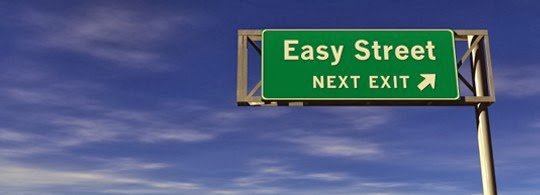We are Hard-Wired to Follow the Easier Path with the Least Resistance
Effort. Much in life takes effort. And much of the time, we make choices based on what we think will require the least effort, not necessarily what is the best choice to make in itself. Whatever is more challenging is often seen as less appealing.
A study published in eLife suggests the brain calculates the cost of effort for various options which influences the behavior we ultimately choose to do. Not only that, but it even affects our perception. The higher the cost to act, the less we pay attention to that option and no longer even see it.
The lowest hanging and easiest to grab fruit requires the least effort, and we won't even bother looking at the rest so essentially we don't even see the rest. We think the lowest hanging fruit is the best to choose.
In the study, 52 people took a series of tests involving a cloud of moving dots. They were asked to judge whether the cloud was moving left or right by moving a handle in the desired direction. But when the researchers added a resisting load to one of the directions, the participants became biased and tended to shift their judgments in avoidance of responding in the direction with the most resistance which requires the most effort.
This means that even if the cloud of dots was moving left, but the resistance weight was applied towards the left handle, people were more likely to judge that the dots were moving towards the right because it was easier for them to choose that direction.
Even more bizarre about this bias is that when the participants were asked to verbally respond with an answer for the movement, they were still answering with a tendency to avoid choosing the direction that had the most effort required. The brain changed how they interpreted the visual input to influence their behavior into choosing the path which required the least effort. And this is all happening automatically.
The results of the research suggests that the traditional view of the motor system is incorrect, where it's an output process that only expresses our decisions based on what we see without actually influencing the decision. The motor response seems to feedback and report the effort required to actualize a decision into an action and will influence whether the choice we make is actually what is represented in reality. So rather than report the actual movement as it is, the brain is fooling itself into an incorrect answer in order to choose the easiest option. The research also suggests that people will be less likely to see the world a certain way if certain behavior is more effortful.
Changing behavior is a difficult thing to do. Many of us have addictions to various things, such as smoking, food, alcohol, drugs, or whatever else. Changing our behavior is something that requires more effort than continuing to do what we already have been doing. Instead of changing our behavior towards what we know is better, we often choose to keep doing what is easier and not change. This influences us to not even see or consider changing our behavior anymore since it's already determined to be too much work compared to the "better" easier option of not changing. Our choices become seen in a more limited or nonexistent (i.e. not seen) way.
The easier path isn't always the best. Sometimes the best path is the hardest with the most effort required.
References:
- Humans are hard-wired to follow the path of least resistance
- Perceptual decisions are biased by the cost to act. eLife, DOI: dx.doi.org/10.7554/eLife.18422


And these days I'd submit the entire effect is exaggerated by the fact that most people have so much "load" in their lives to merely keep themselves "running in place" ("50% of Americans Live Paycheck-to-Paycheck" etc.) that taking the easy way out becomes an active survival strategy rather than a subtle influence.
Makes me think we're all being pushed down the layer cake that is Mr. Maslow's infamous pyramid....
We are indeed. We end up on a cycle going round and round unaware of it because we're not paying attention to what's really happening... just take the easy path, go along to get along, don't rock the boat, keep the peace, etc. Varying degrees of course, but it leads to a downward motion when the overall mood is to be self-concerned with things that only affect us personally in our immediate perception of what is around us, short sighted, and not looking at the larger picture. Those who go along to get along will go with the changes towards whats better or worse because they aren't too aware of the larger picture taking place from smaller movements.
I think im fuqed equipment cause im always taking the hard road.
nothing good in life is easy.
Did you see the story I made with you as the hero?!?!?!?
:O
https://steemit.com/steemit/@skeptic/the-world-championship-steemit-posting-contest-a-steemit-erotic-fanfiction
Heuristics, or mental shortcuts, are evolutionary mechanisms which are "baked in" to human thinking; they save those precious calories LOL
The flip side to those heuristics are cognitive biases, of which @krnel has written so much.
(I've got these posts in a list if you want me to comment them here, unless you'd like to update and/or reSteem later)
Cognitve biases have negative effects, and are basically heuristics gone bad
Hehe, yeah, watch out for those biases. Quick to provide answers but they may lead one on the wrong path ;)
Very interesting, gives us a lot to think about... are we inherently lazy?
I'm guilty of sometimes taking the path of least resistance. I don't always see it as a bad thing but 'nothing worthwhile comes without a struggle', as they say.
This subject reminds me of brain plasticity and how our brains are wired through habit. Breaking old habits is difficult because it often necessitates the creation of new neurons pathways and creating new neural networks, but it is possible to rewire the brain - neuro-plasticity , and that too requires sustained effort.
Yup, effort is often required for greater more meaningful change, like our habits or behavior. Thanks for the good insights as usual.
https://steemit.com/health/@j3dy/what-is-brain-plasticity-how-does-it-work-and-what-you-can-do-to-enhance-the-plasticity-of-your-brain
I'd like some thoughts on the topic, add some if you have ideas, or leave some links for more information, I'm interested in the topic so much so I'd like to get to the bottom of it :D Since my post is a bit old and I haven't thought about that topic in the mean time.
I don't quite agree for all circumstances. In general day to day behaviour, yes I would agree.
It is just that we have a limited amount of mental energy and have to choose where to dedicate it. That is the whole field of heuristics and biases. The thing I took away from Daniel Kahneman's "Thinking, fast and slow" is that while our brain is certainly capable of amazing rational thinking, most of the time we are not using that level, out of energy conservation.
There are mental shortcuts that are (or used to be at least) good enough to navigate day to day life with relatively successful outcome (like not dying).
In more abstract and complex fields these heuristics and biases are potentially not applicable anymore.
We like to think we are rational beings, while in fact most of the time we are demonstrably not making rational decisions.
Check out Dan Ariely:
BUT there are situations where hard things provoke curiosity and an irresistible challenge.
At heart we are problem solvers, where we enjoy the full unleashing of our rational mind with sometimes spectacular results. The trick is that you need to enter in a positive feedback loop that set this mental engagement in motion.
In fact, if it is too easy such activities are too boring, if they are too hard, we don't even try so it has to hit a sweet spot of difficulty, within grasp of our current competency but not quite.
Check out the Flow concept Mihaly Csikszentmihalyi :
Once you find such an activity, what takes over is intrinsic motivation:
A hugely important concept much more people should understand, Dan Pink has a masterful explanation about it:
Yeah, if you're really into something, get really good at it, you get "in the zone" and it's mostly automated responses based on stimulus and it's all present moment experience without needing to think about what to do next, it just comes naturally. That's when it's easy and good ;) Thanks for the feedback, I'll check that first video later. Rationality is not maximized through automatic involuntary unthinking, but needs to be willfully voluntarily engaged in with conscious effort.
Isn't the easiest choice our "default" setting, and therefore it takes a conscious effort to take a harder choice, one with greater consequences, or less rewards?
Indeed. The easier may pan out as the best, but might not as well. It takes conscious effort to evaluate the situation and recognize which option is better than others, despite it being harder to do.
Upvoted and followed, resisted the temptation to procrastinate and "read later. Great post and sums me up to a tee, sadly. Thanks for posting this.
Indeed, I can relate with taking easy roads myself hehe. Thanks for reading ;)
Evolution is a powerful thing! Who doesn't take a shortcut when you're jogging and you need to make a turn at a right-angled crossing?
What an interesting read, now if I could give my 2 cents worth. I believe that the factor of motivation changes the path our brains chose. For example, if I were the person reaching for the fruit on the lower branch and the fruit was for me, then yes I would just grab the first easiest one I see, HOWEVER, if the fruit was for a loved one and the fruit higher up in the tree were more plump and looked more appealing, then I would go the extra mile to get the loved one the better fruit. So my path was motivated by love. Just a thought. Thanks for sharing